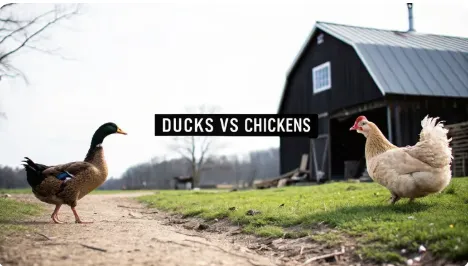
Raising Ducks vs Chickens: Which Is Best for Your Homestead?
Raising Ducks vs Chickens: Which Is Best for Your Homestead?
So, you’re trying to decide between ducks and chickens. It’s a classic homesteading crossroads, and for good reason. On the surface, they both give you fresh eggs and meat, but how they get there couldn't be more different. Their personalities, their daily needs, and the way they interact with your land are worlds apart.
Before we get into the nitty-gritty of coop designs or feed bills, let's zoom out. This isn't just about choosing a bird; it's about choosing a system that fits your property, your climate, and your patience.
Think of it this way: Ducks are the rugged, low-maintenance foragers of the poultry world. Chickens are the more familiar, tidier option that most beginners start with. One makes a glorious, watery mess while gobbling up every slug in your garden; the other will neatly till your flower beds into oblivion if you turn your back for five minutes.
The choice really boils down to what you value more: low-maintenance hardiness or cleanliness and simplicity.
A Practical Comparison of Ducks and Chickens
Let's break down the core differences that will shape your daily life with these birds. This isn't just a list of pros and cons—it's about understanding the trade-offs you're making from day one.
Hardiness and Health
Ducks are built like little tanks. They are incredibly hardy, shrugging off cold, wet weather that would have chickens huddled and miserable. Their natural waterproofing and robust immune systems make them far less susceptible to common poultry illnesses.
Chickens, on the other hand, can be a bit more delicate. They need protection from drafts and dampness, and they're prone to a longer list of ailments, from respiratory issues to parasites.
Foraging Style and Garden Impact
This is a huge differentiator. Chickens are voracious scratchers. It's in their DNA. While this is great for turning over a compost pile, it means they will systematically dismantle a garden bed in search of bugs and seeds.
Ducks are much gentler foragers. They dabble and drill for slugs, snails, and other pests without the destructive scratching. They are the superior choice for pest control if you want to let your flock roam anywhere near your prized plants.
Infrastructure and Housing
Housing needs are fundamentally different. Chickens need elevated roosting bars to sleep on at night and private, raised nesting boxes to lay their eggs. It's a vertical setup.
Ducks are ground-dwellers. They need a safe, ground-level shelter with clean bedding. Most importantly, ducks need access to water—not just for drinking, but a small pool or tub deep enough to dunk their heads to clean their eyes and bills. This is non-negotiable for their health.
Egg Production
When it comes to eggs, both are fantastic producers. However, many duck breeds, like Khaki Campbells or Pekins, are famous for laying consistently right through the dark, cold days of winter when most chicken breeds slow down or stop completely.
Duck eggs are also larger, richer, and have a higher fat content, making them a baker's dream. If a year-round egg supply is your top priority, ducks often have the edge.
To help you see it all side-by-side, here’s a quick rundown of the major differences.
Quick Comparison: Ducks vs. Chickens
This table cuts right to the chase, summarizing the key factors you'll want to weigh when making your decision. It’s a bird’s-eye view to help you match the right poultry to your homestead's needs.

Ultimately, neither bird is "better"—they're just different. Use this overview as your starting point, and as we dive deeper in the following sections, you'll get an even clearer picture of which one belongs on your land.
Comparing Housing and Space Requirements
When you're deciding between ducks and chickens, one of the first and most practical differences you'll run into is their housing. While both need a safe place to shelter from predators and bad weather, how they use that space day-to-day is completely different. A common mistake I see beginners make is thinking they can just stick ducks in a standard chicken coop—and while you can, it often takes a lot of tweaks to get it right.
The biggest reason for this comes down to one simple fact: chickens think vertically, while ducks think horizontally. Chickens have a deep-seated instinct to get up high at night for safety. They want to fly up onto roosting bars, keeping them off the ground and away from anything that might sneak in. It's a core part of who they are.
Ducks, on the other hand, are ground-dwellers through and through. They have absolutely no desire to roost and are perfectly happy snuggled down in a deep, clean pile of bedding on the floor. Their heavy bodies and short legs just aren't built for perching, which makes roosting bars completely useless and even a potential hazard for them.
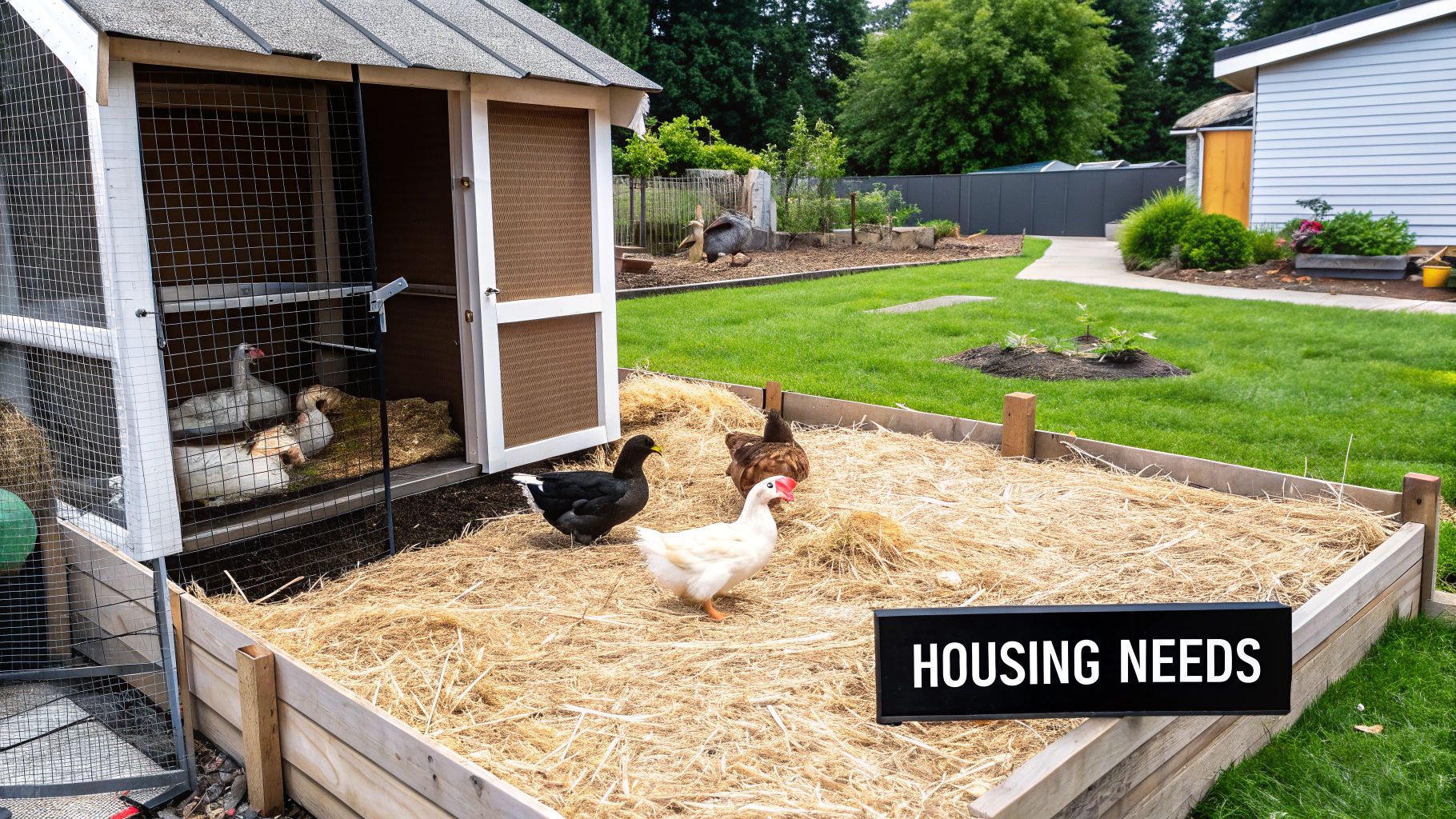
Designing the Ideal Coop Space
For chickens, a good coop design is all about that vertical space. You need plenty of elevated roosting bars with enough linear feet for every bird to perch without getting crowded. You'll also want to install raised, private nesting boxes where your hens feel secure enough to lay their eggs. Our full guide on building a chicken coop for beginners covers all these vertical must-haves in detail.
A duck house, however, needs none of that. Your focus shifts entirely to floor space and ventilation. Since ducks live their whole lives on the ground, a simple, low-slung shed works perfectly. They prefer making their own nests in a quiet corner, so giving them a thick layer of straw or pine shavings is all it takes to make them feel at home.
Key Differentiator: The single most critical element for a duck house is top-notch ventilation. Ducks give off a huge amount of moisture just by breathing—not to mention their messy water habits. This can create a damp, humid environment fast, which is a recipe for health problems. Vents placed high up in the walls let this moist air escape without creating a draft down where the ducks are sleeping.
Comparing Run and Outdoor Space Needs
The differences don't stop at the coop door; they extend right into the outdoor run. How each bird interacts with its environment will directly impact your land and your predator-proofing strategy.
For Chickens:
Destructive Tendencies: Chickens are scratching machines. They will till up your grass, tear apart garden beds, and dig giant craters for dust bathing. This means their run often turns into bare dirt unless it's either massive or you move it frequently.
Predator Vulnerability: Chickens are a target from both the ground (raccoons, foxes) and the air (hawks, owls). Their run needs to be completely locked down, including a secure top cover like hardware cloth or bird netting.
For Ducks:
Gentle Foragers: Ducks are much easier on the landscape. They dabble in damp soil looking for bugs and slugs but don't have that powerful scratching instinct. This makes them far gentler on lawns and garden areas.
Predator Defense: While ducks aren't as tempting to most hawks, they are incredibly vulnerable to ground predators, especially at night. Their run needs a solid, dig-proof fence, but a top cover is usually less critical unless you have a severe aerial predator problem.
If you're planning a mixed flock, you'll need a hybrid approach. You can build low, wide platforms for the ducks to rest on while the chickens use their traditional roosts up above. The most important thing is to ensure the coop is spacious and extremely well-ventilated to handle the moisture ducks bring in. This benefits the respiratory health of the entire flock. It's all about accommodating the horizontal needs of your ducks without taking away the vertical instincts of your chickens.
Analyzing Diet Needs and Foraging Behavior
What you feed your flock is one of the biggest daily factors in the ducks vs. chickens debate. It directly hits your budget, your land, and your workload. While both birds can get by on standard poultry feed, their specific needs and foraging styles create two completely different homestead scenarios.
On the surface, both ducks and chickens need a balanced feed with plenty of protein. But ducklings have one critical requirement that chicks don't: higher levels of niacin. Niacin (Vitamin B3) is absolutely essential for proper bone and leg development in waterfowl, and a deficiency can quickly lead to crippling leg problems.
Standard chick starter often doesn't have enough niacin for ducklings, but this is an easy fix. Just sprinkle a little brewer's yeast over their feed every day for the first few weeks. It's a simple, cheap supplement that makes all the difference.
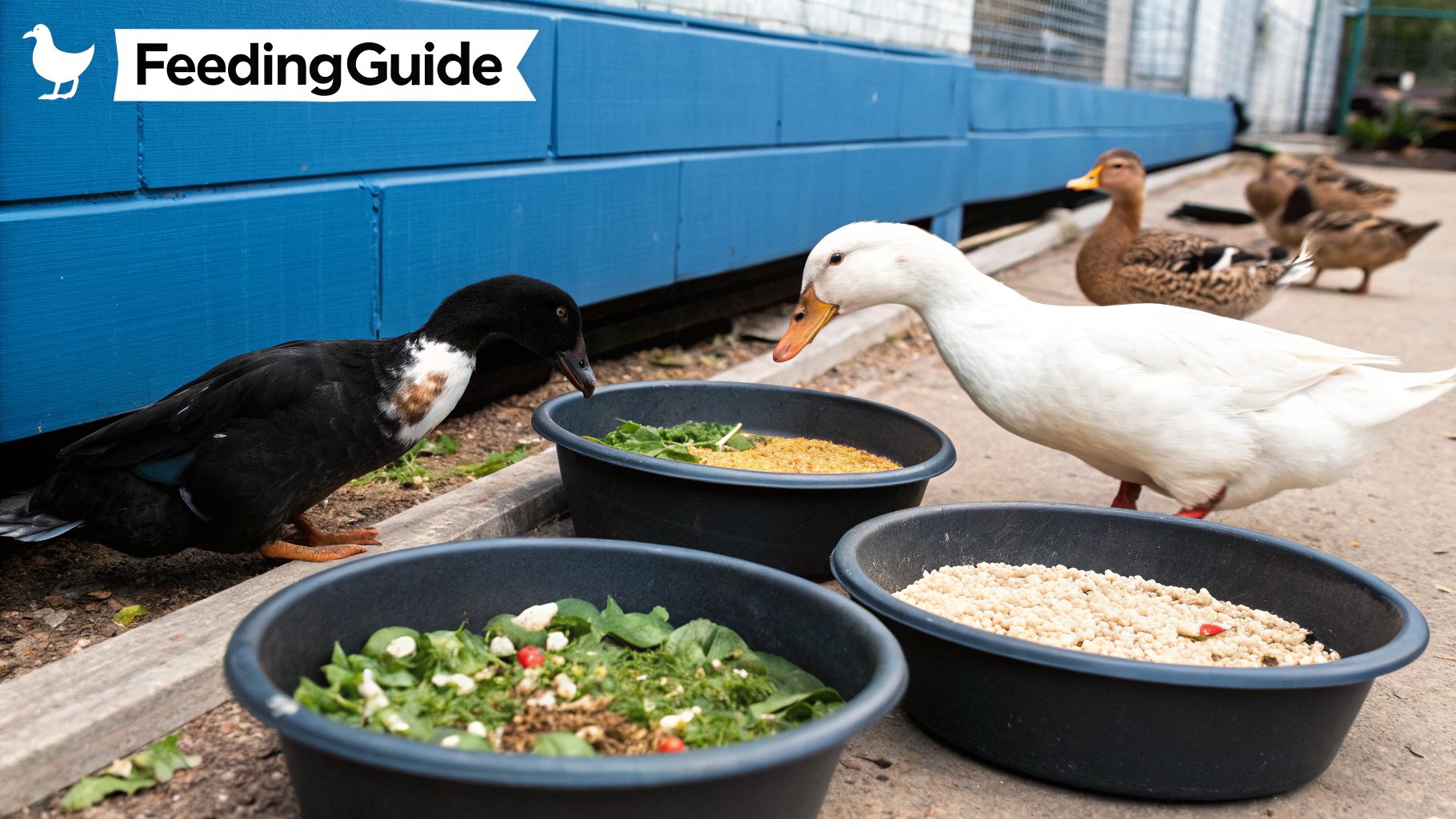
Foraging Styles: Garden Friend or Foe?
Beyond the feed bag is where the real magic—and potential chaos—happens. When your birds start foraging, their natural instincts can make them either a valuable partner or a destructive force on your property.
Chickens are born tillers. They have an unstoppable instinct to scratch and dig, turning over every loose bit of soil, mulch, and compost they can find. This is fantastic if you want to aerate a compost pile or clear a garden bed after the season. But that same behavior means they will absolutely dismantle a beautiful flower bed or your prized vegetable garden in a matter of minutes.
Ducks, on the other hand, are nature's pest control. They forage with their bills, dabbling in damp soil and sifting through grass for slugs, snails, and insects. They do this without the destructive scratching, making them a much safer bet to let roam near your cultivated areas.
A small flock of ducks can wipe out a slug problem in a garden without uprooting a single plant. They literally turn pests into a free source of high-quality protein.
Managing Mess and Feed Waste
Feeding time is another area where the differences become crystal clear, especially when it comes to mess. Chickens are fairly tidy eaters. They peck at their feed, and while a little gets scattered, it's generally manageable.
Ducks are notoriously messy. It's in their nature to mix water with their food, creating a soupy, wet mash that they splash everywhere. This habit can lead to a ton of wasted feed and a permanently muddy, swampy area around their food and water stations.
To get around this, many duck keepers use specialized setups to minimize the mess:
Treadle Feeders: These feeders have a lid that only opens when a bird stands on a platform, keeping the feed clean, dry, and contained.
Deep Waterers: Using deep buckets or poultry nipples for water prevents ducks from dunking their heads and sloshing water everywhere.
Separated Stations: Placing food and water several feet apart is a simple but effective trick. It forces ducks to walk between them, which cuts down on how much water they can carry in their bills to mix with the feed.
Making your own poultry feed is a great way to cut costs, and our guide on how to make chicken feed offers a solid starting point. Just remember to adapt it for ducks with that all-important niacin supplement.
Finally, think about the economics of it all. In some parts of the world, like China, a strong cultural preference for duck meat drives a highly efficient production market, justifying different feed strategies. Here in North America, where chicken reigns, fluctuating feed costs will have a different impact on the profitability of raising either bird on a small or large scale. Understanding these bigger trends can help you plan for the long run.
Evaluating Egg and Meat Production Yields
Let’s be honest, for many of us, the real reason we keep poultry is to put food on the table. When you pit ducks against chickens, the conversation always comes down to eggs and meat. But it's not a simple numbers game. The quality, the timing, and the final product from each bird offer unique perks depending on what you’re trying to achieve on your homestead.
When it comes to eggs, chickens are the familiar gold standard. A solid laying hen like a Leghorn or Rhode Island Red will reliably churn out over 250 small to medium-sized eggs a year. Their laying cycle is predictable, and it’s what most people are used to. If you're looking to maximize your flock's output, our guide to raising chickens for eggs is a fantastic starting point.
Ducks, on the other hand, bring a different kind of hustle to the egg basket. Breeds like Khaki Campbells or Pekins are absolute powerhouses, often laying 300 or more large eggs annually. Even better, many duck breeds couldn't care less about shorter daylight hours, meaning they'll often lay straight through the winter when your chicken production has slowed to a crawl.
The Great Egg Debate: Duck vs. Chicken Eggs
Beyond the sheer number, the eggs themselves are worlds apart. A chicken egg is the classic kitchen staple—perfect for frying, scrambling, and everyday cooking.
Duck eggs are a whole other culinary adventure. Their larger size, thicker shells, and much higher fat content in the yolk create an incredibly rich, creamy flavor. This is exactly why bakers prize them; they produce loftier cakes, richer custards, and more decadent pastries.
Key Insight: If your main goal is a steady, year-round supply of eggs, especially for baking and rich dishes, ducks often have a clear edge. Their winter laying can keep your kitchen stocked just when your chickens decide to take a seasonal break.
Comparing Meat Production and Processing
For homesteaders raising birds for the table, the choice between ducks and chickens is a trade-off between growth speed, meat quality, and the effort it takes to process them.
The undisputed king of fast growth is the Cornish Cross chicken, which can hit a processing weight of over 5 pounds in just 8-9 weeks. They are incredibly efficient at turning feed into meat, making them a go-to for many.
Pekin ducks, a top choice for meat, also grow impressively fast, reaching a market weight of 7-8 pounds in only 7-8 weeks. While they pack on weight quicker, they are known for being voracious eaters during that short growth spurt.
Once you’ve raised your chickens for meat, knowing how to handle the harvest is crucial. Understanding basics like how to thaw a frozen chicken safely ensures your hard work results in a great meal.
The real difference shows up in the final product. Chicken offers that familiar lean white breast meat and richer dark meat. It’s versatile and universally loved. Duck meat, however, is entirely different. All of its meat is dark, rich, and covered by a thick, flavorful layer of fat that chefs go wild for. It has a much more robust, savory flavor that holds up to strong pairings.
This infographic provides a clear visual comparison of two key resilience metrics between ducks and chickens.
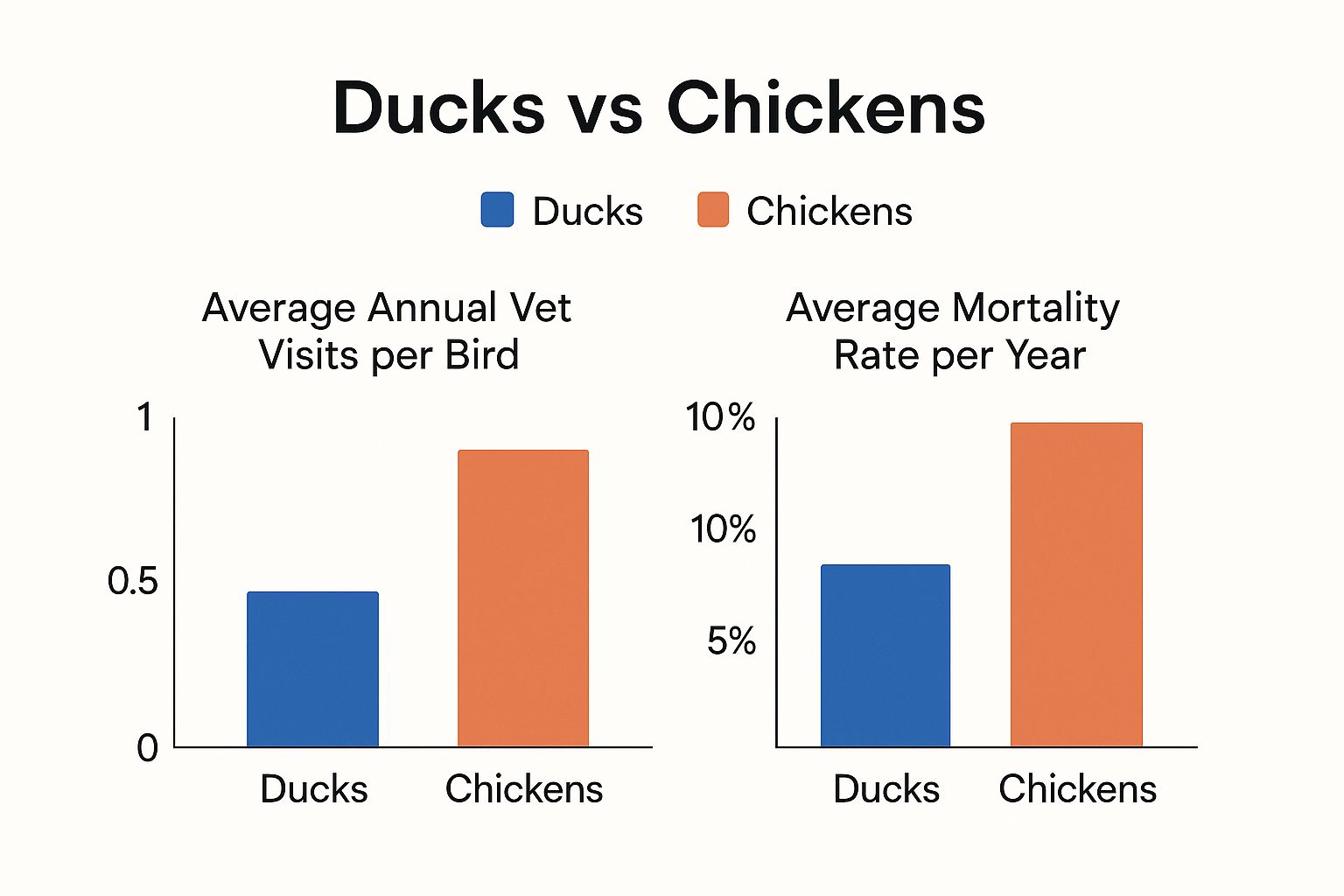
The data highlights the superior hardiness of ducks, showing they experience half the annual vet visits and a significantly lower mortality rate compared to chickens.
Here’s the catch: turning a duck into a meal is more work. Their waterproof feathers and downy undercoat make plucking a real challenge compared to a chicken. The process often requires scalding at a very specific temperature and sometimes even waxing to get all those fine pinfeathers off—a step you’ll never need with chickens. That extra labor is a critical factor to weigh if you plan on processing your own birds.
To put the numbers side-by-side, here’s a quick breakdown of what you can expect from popular breeds.
Egg and Meat Yield Comparison
This table offers a detailed look at the production metrics you can expect from some of the most common duck and chicken breeds.

Ultimately, the "better" bird depends entirely on your homestead's needs. If you want a consistent, year-round supply of rich eggs and gourmet dark meat (and don't mind a little extra work on processing day), ducks are a fantastic choice. If you prefer familiar, lean meat and a steady supply of all-purpose eggs during the main season, chickens remain a tried-and-true classic.
Understanding Health and Climate Adaptability
When you’re deciding between ducks and chickens, one of the biggest differences you'll run into is just how tough they are. The overall health and hardiness of your flock will shape your workload, your vet bills, and your general peace of mind. And while both birds can do great with the right care, ducks seem to have a natural edge in the resilience department.
Most folks who’ve raised both will tell you that ducks are just plain sturdier. They seem to shrug off many of the common poultry ailments that keep chicken keepers on their toes. Their immune systems are famously robust, so they’re less likely to suffer from the respiratory infections that can sweep through a chicken coop, especially in damp or poorly ventilated spaces. Ducks also have a built-in defense against external parasites like mites and lice, thanks to their oily, waterproof feathers and a love for bathing.
This isn’t just trivia—it makes a real-world difference. If you're homesteading in a place with cool, wet weather, ducks are almost perfectly designed for it. Their waterproof down coat keeps them warm and dry in conditions that would leave chickens chilled, miserable, and susceptible to getting sick.
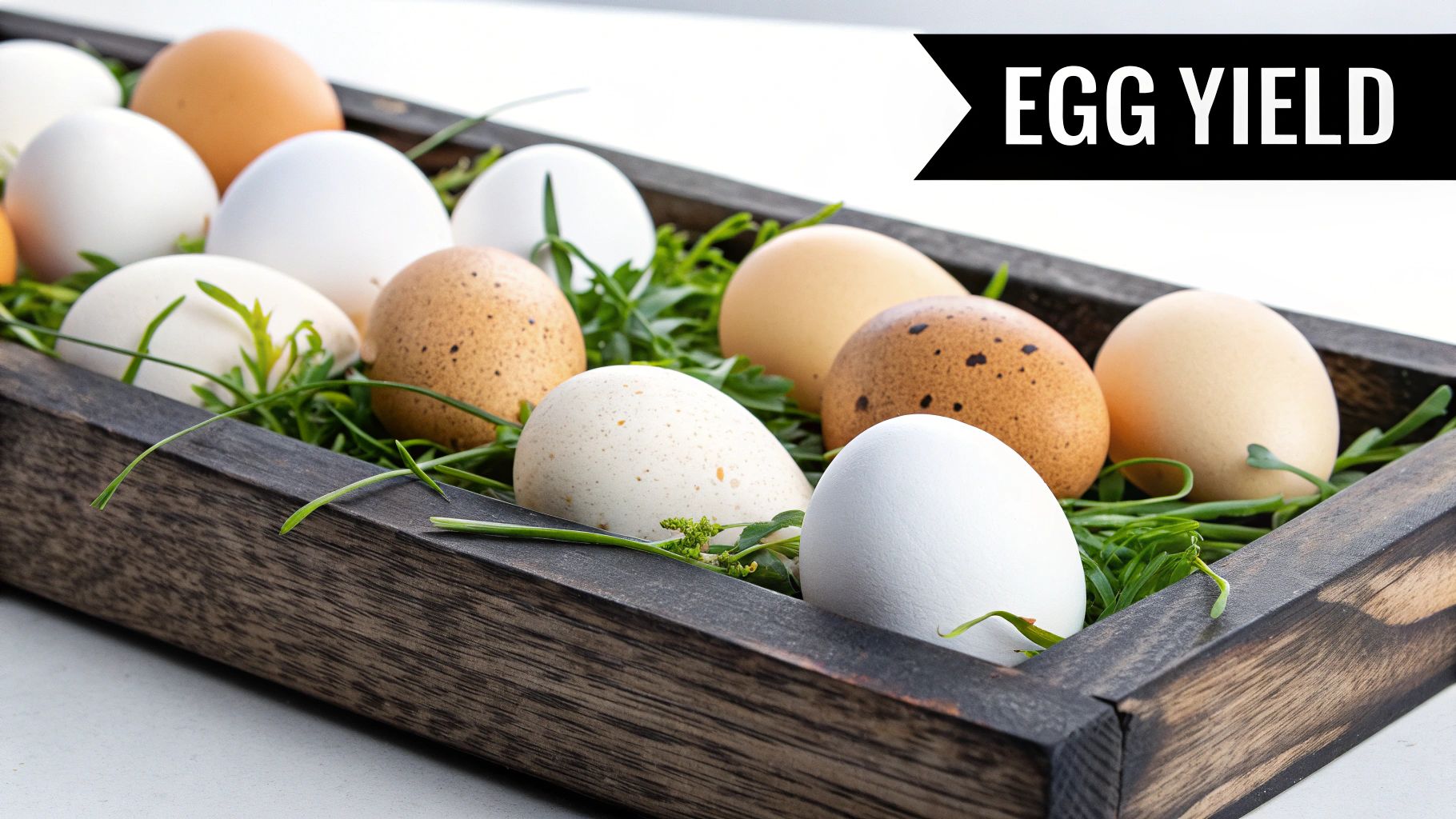
Adapting to Different Climates
While ducks are champs in the cold and rain, chickens definitely have the upper hand when the heat is on. Lighter chicken breeds like Leghorns or other Mediterranean types are much better at handling high temperatures than heavy-bodied ducks such as Pekins. During a scorching summer, ducks can really struggle with heat stress. They absolutely need plenty of shade and cool water to wade in just to stay comfortable.
This climate-specific adaptability is a huge piece of the puzzle.
For Cold, Wet Regions: Ducks are the clear winner here. Their natural weatherproofing means they’ll be out foraging in a drizzle or a light snow, staying productive and happy when chickens would be huddled up inside their coop.
For Hot, Dry Regions: Chickens, especially heat-tolerant breeds, are often the smarter choice. They regulate their body temperature more effectively in the heat, which means less risk of stress and loss during a heatwave.
Key Takeaway: Your local climate is one of the best indicators of which bird will thrive with less intervention. Ducks are built for the damp and cold, while many chicken breeds are better equipped for dry heat.
Common Health Issues to Watch For
Of course, no bird is bulletproof. Both ducks and chickens have their own species-specific health issues to look out for, and good management is all about getting ahead of these problems before they start.
Chickens, especially as young chicks, are quite susceptible to coccidiosis, a parasitic intestinal disease. While it’s manageable with medicated feed and good sanitation, it can cause serious losses. They're also prone to Marek's disease and various respiratory illnesses if their coop isn't kept clean and dry.
Ducks face their own challenges. Bumblefoot, an infection on the bottom of the foot, can be a problem if they're kept on rough surfaces or in constantly mucky pens. Ducklings also have a critical need for niacin in their diet; without it, they can develop serious leg and joint issues—a requirement that's much less pronounced in chicks.
Looking at the bigger picture, global production trends show the economic forces at play. The entire poultry market, which includes both birds, is projected to grow by 2.5% to 3% because of strong demand. While ducks are a smaller niche, their premium status and cultural importance in many regions confirm their viability. You can discover more insights about the global poultry outlook and see how these trends might shape your own homesteading plans.
So, Which Bird Should You Choose for Your Homestead?
After weighing the differences in housing, feed, and hardiness, the classic "ducks vs. chickens" debate really comes down to your own vision for your land. Forget generic pro/con lists. The right choice becomes obvious when you match the bird to your circumstances.
Think of it like a gut check for your homestead. What does your property look like? What are you really hoping to get out of your flock? Answering those questions honestly will lead you right to the bird that fits your life, making the whole experience far more rewarding.
Making the Call Based on Your Setup
Let's skip the abstract comparisons and get down to brass tacks. Your climate, your space, and what you expect from your flock are what matter most.
You live in a wet, northern climate and are tired of garden pests: Ducks are your answer. Their natural resilience makes them a perfect fit for cold, damp weather, and their constant foraging is basically free pest control for slugs and snails.
You have a smaller backyard, prefer things tidy, and want a simple setup: Chickens are the better fit here. Their housing is more compact, their waste is drier and easier to handle, and their needs are generally more straightforward for first-timers.
Your top priority is a steady supply of rich eggs for baking, especially year-round: Go with ducks. Many duck breeds lay straight through the winter when chickens often quit, and their large, high-fat eggs are second to none for custards, cakes, and pasta.
For homesteaders who want a low-maintenance, resilient bird that works with a diverse garden, ducks often turn out to be the more practical choice. They require less hand-holding and bring more to the table than just eggs or meat.
A Few Final Questions to Ask Yourself
Before you commit, think about your own personality and primary goals. There’s no single "best" bird—only the best bird for you.
What's my tolerance for mess? Ducks are messy with water, period. They'll turn any water source into a muddy playground. If you value a clean, orderly coop area, chickens are the tidier option by a long shot.
What's my main goal? For rich, dark gourmet meat and incredible baking eggs, choose ducks. For the familiar, lean meat and a standard egg supply everyone recognizes, chickens are the classic choice for a reason.
How much do I want to manage flock drama? Ducks tend to be calmer and less prone to the pecking order chaos that can stress a chicken flock. Chickens have more complex social dynamics that often require a bit more observation and management.
At the end of the day, both birds have a solid place in the global poultry market, which is projected to hit around USD 364.5 billion. That massive scale supports everything from huge commercial operations to small backyard flocks, proving that both ducks and chickens are valuable—it just depends on what you're trying to achieve. You can read more about the growth of the global poultry market to see how these broader trends play out.
Lingering Questions: Ducks vs. Chickens
Even after weighing the pros and cons, a few key questions always seem to come up. Let's tackle the common head-scratchers that homesteaders face when they're on the fence in the great ducks vs. chickens debate.
Can You Raise Ducks and Chickens Together?
Yes, you can—but it takes a little planning. The biggest challenge isn't temperament; it's managing their completely different lifestyles in one space.
Think of it like this: chickens are clean freaks who like to stay dry and roost high, while ducks are messy water lovers who live on the ground. A mixed flock coop needs to accommodate both. That means ground-level access for ducks, elevated roosts for chickens, and excellent ventilation to handle the incredible amount of moisture ducks bring in.
You also absolutely have to separate their water. Ducks will turn a clean chicken waterer into a mud pit in minutes, which is a health hazard for your chickens. The easiest fix is using poultry nipple waterers for the chickens and giving the ducks their own separate tub or small pool to splash around in.
Which Is Better for Beginners?
For most people just starting out, chickens are the easier entry point. Their needs are well-documented, their housing is simpler to build, and you can find their feed just about anywhere. They're also significantly less messy, which makes managing a small backyard flock a much cleaner experience.
That said, if you live somewhere cold and wet or have a biblical slug problem, ducks might actually be the lower-maintenance choice. Their natural hardiness and love for foraging can make them a better fit for certain environments right out of the gate.
Are Ducks Louder Than Chickens?
This one really depends on the breed and, more importantly, the gender. A flock of hens makes a pleasant, low-key clucking sound that’s pretty easy on the ears. A rooster's crow, on the other hand, can be a neighborhood-waking event.
Most female ducks—especially popular breeds like Pekins—have a very loud, commanding quack. Male ducks, called drakes, are the quiet ones, making only soft, raspy noises. If keeping the peace with your neighbors is a top priority, a flock of hens (no rooster) or a flock of ducks with just a drake or two will be your quietest options.
Situational Advice: In a suburban or urban backyard, a small flock of chicken hens is almost always the safest bet. Their gentle daily chatter is far less likely to cause a stir than the startlingly loud quack of a female duck.
Do Ducks Really Need a Pond?
Nope. Ducks don't need a picturesque farm pond to live a happy, healthy life. What they absolutely do need is water deep enough to dunk their entire heads into. This isn't just for fun—it's essential for cleaning their eyes and nostrils to prevent infections.
A simple kiddie pool, a large stock tub, or even a deep cement mixing tray will do the job perfectly. Just be ready to dump and refill it often, because they'll have it looking like a swamp in no time. Providing this basic water access is a non-negotiable part of responsible duck ownership.
At The Grounded Homestead, we believe the right information makes all the difference. Whether you choose the reliable cluck of a chicken or the hardy charm of a duck, our goal is to help you build a more sustainable and fulfilling life. Explore more guides and tips to grow your homestead with confidence at https://thegroundedhomestead.com.

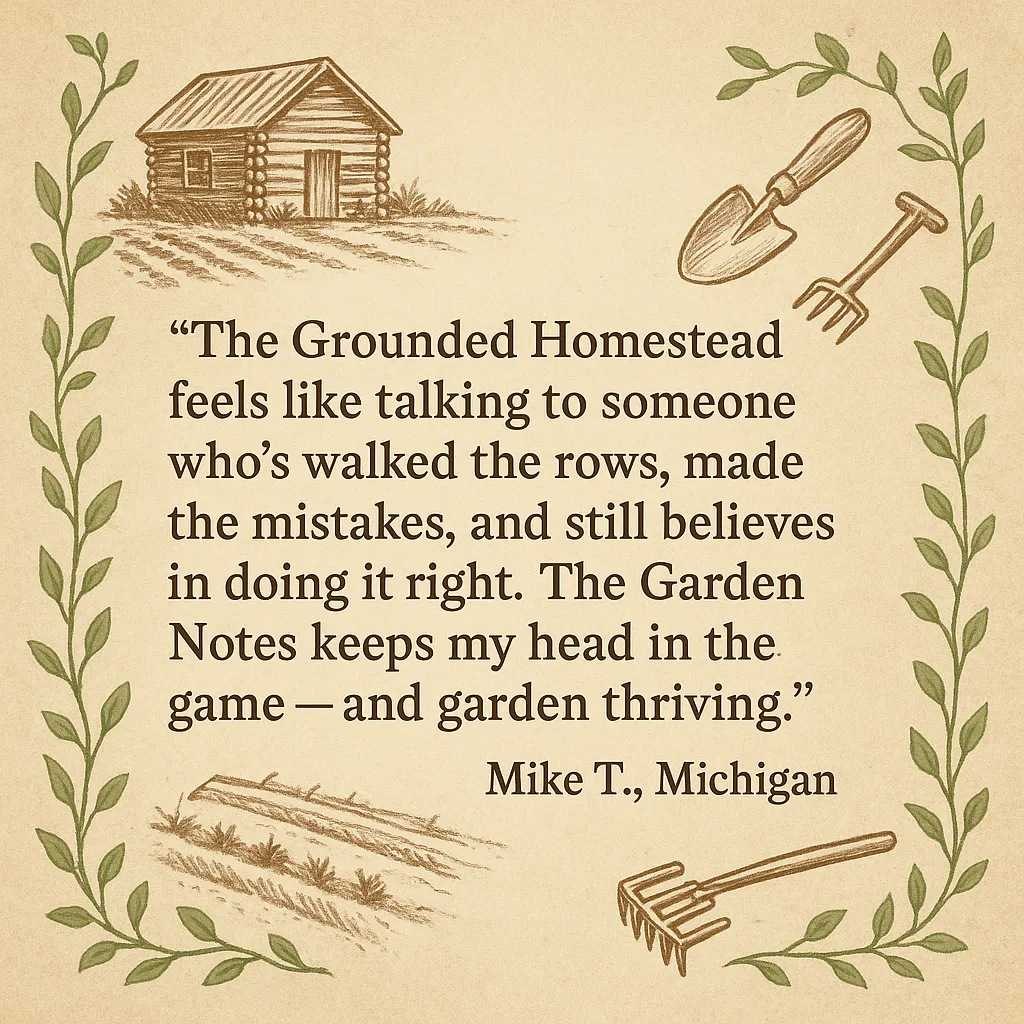
Facebook
Instagram
X
Youtube